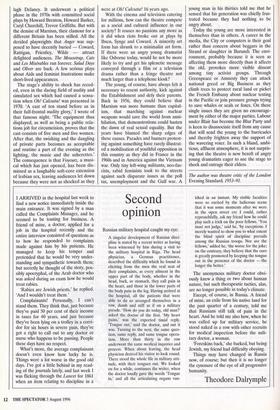Second opinion
I ARRIVED in the hospital last week to find a new notice immediately inside the main entrance. It was signed by a man called the Complaints Manager, and he seemed to be touting for business. A friend of mine, a doctor, applied for a job in the hospital recently and the entire interview consisted of questions as to how he responded to complaints made against him by his patients. He managed to keep his temper and pretended that he would be very under- standing and sympathetic towards them; but secretly he thought of the story, pos- sibly apocryphal, of the Arab doctor who was asked during an exam how he would treat rabies.
'Rabies are Jewish priests,' he replied. 'And I wouldn't treat them.'
Complainants! Personally, I can't stand them. They think that, just because they've paid 50 per cent of their income in taxes for 40 years, and just because they've been lying on a trolley in a corri- dor for six hours in severe pain, they've got a right to call out to any doctor or nurse who happens to be passing. People these days have no respect.
What's more, the average complainant doesn't even know how lucky he is. Things were a lot worse in the good old days. I've got a little behind in my read- ing of the journals lately, and last week I was flicking through the Lancet for 1861 when an item relating to discipline in a
Russian military hospital caught my eye: A singular development of Russian disci- pline is stated by a recent writer as having been witnessed by him during a visit to the military hospital in Riga. The head physician, a German practitioner, described the difficulty which he found in eliciting from the men the real seat of their complaints, as every ailment in the upper part of the body, whether in the head, back, or stomach, they call pain in the heart, and those in the lower parts of the body pain in the leg, Having arrived at the hospital, all the patients that were able to do so arranged themselves in a row, dumb and stiff as if on a military parade. 'How do you do today, old man?' asked the doctor of the first. 'My heart pains,' was the expected timid reply. 'Tongue out,' said the doctor, and out it was. Turning to the next, the same ques- tion, same reply, and same tongue opera- tion. More than thirty in the row underwent the same medical inquiries and process. When about leaving, the head physician desired his visitor to look round. There stood the whole file in military atti- tude, with their tongues out. We looked on for a while, continues the writer, when the doctor loudly gave the words 'Tongue in,' and all the articulating organs van- ished in an instant. My risible faculties were so excited by the ludicrous scene that it was some moments after we were in the open street ere I could, rather reproachfully, ask my friend how he could play such a trick on the poor fellows. 'You must not judge,' said he, 'by exceptions. I merely wanted to show you to what extent the blind spirit of discipline prevails among the Russian troops. Nor are the fellows,' added he, 'the worse for the joke; on the contrary, they believe that the cure is greatly promoted by keeping the tongue out in the presence of the doctor — the longer the better.'
The anonymous military doctor obvi- ously knew a thing or two about human nature, but such therapeutic tactics, alas, are no longer possible in today's climate. Except, of course, in Russia. A friend of mine, an exile from his native land for the past quarter of a century, told me that Russians still talk of pain in the heart. And he told me also how, when he was called up for military service, he stood naked in a row with other recruits for medical inspection before the mili- tary doctor, a woman.
'Foreskins back,' she barked, but being Jewish, my friend had difficulty obeying. Things may have changed in Russia now, of course; but then it is no longer the cynosure of the eye of all progressive humanity.
Theodore Dalrymple


















































 Previous page
Previous page